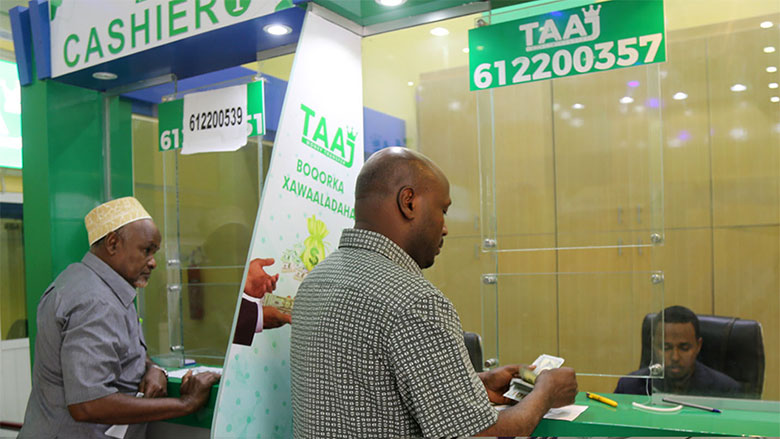A recent innovation that is ensuring that no one is left behind in the 2030 Sustainable Development Goals is mobile money technology and Somalia is one of the countries that have immensely benefited through financial inclusion. Mobile money started in Somalia ten years ago through a simple exchange of airtime credit and today about 155 million mobile money transactions take place every month worth 2.7 billion dollars and over 14 million people are accessing and using mobile money to perform different transactions. Hormuud telecom operating in the south and Telesom telecom operating nationally are the two tech companies providing mobile money services to the population using EVC+ and ZAAD services. The services provided on mobile money include; payment of school fees, wages and salaries, daily purchases and transactions, utilities, remote-remittance, micro-payments, and informal air-time battering schemes among others.
The rapid adoption of mobile money technology in Somalia over the years is attributed to the depreciation of the local Somali shillings, insecurity of carrying large sums of cash or dollars especially in areas run by tribal militias or Al-Shabaab for fear of losing ones’ life, large volume of remittance received by Somali communities globally, increased confidence in use of mobile money for saving money where 73 percent of Somalis prefer to save their money in their phones instead of banks. More still, telecom companies in Somalia do not charge any fees for all transactions performed internally, except for overseas transactions. In the case of Hormuud, which holds the largest market share, the company does not require agents for transaction exchange to happen and most people use informal mechanisms of transferring money to a friend’s mobile money account in exchange for cash. It also serves as a cheaper alternative given that the administrative cost of delivering cash to people through agents or vouchers is higher and requires physical access.
Upto date, this technology has enormously impacted on the economy through enhancing financial inclusion, because before the initiation of mobile money system in Somalia, people in remote rural areas were left behind and could hardly access the financial assistance coming from their family members and relatives or even the government itself, a good example was in 2017 after severe droughts hit the country, $10 million were transferred to one million Somalis within one month using mobile money accounts. Mobile money has played a great role of intermediation in the financial sector because the nation lacks a strong formal banking system. Similarly , mobile money has also contributed to women economic empowerment by enabling the vulnerable women who have been hit most by the impact of the 3 decades civil wars to access finances to operate their small businesses, fend for their families and receive remittances from friends and relative who took asylum in other countries across the globe.
However, the major challenge that remains for the Somali government to resolve to enable the population enjoy the full opportunities offered by this digital technology include lack of regulation which makes it susceptible to fraud, theft and laundering. More still, mobile money is vulnerable to terrorism financing because there is a weak “know your customer” compliance, in line with global banking standards, meaning few SIM cards and mobile money accounts are registered using a valid form of identification subsequently resulting into limited accountability and traceability. Dollarization of the economy is also another challenge since the main currency used for mobile money is US Dollars which causes harm to the local monetary economy making the industry to contribute less in revenues to the government.
To transform this trajectory that poses a threat to the future of digital financing in Somalia, the government should establish parity between online and offline credit for mobile payments, develop trusted “Know-Your-Customer” systems so that illicit business norms and fraud are mitigated, ensure interconnection between mobile payments and Mobile Network Operators ,pass the Communications Act to license Mobile Network Operators and lastly establishing the central banking system to transition the economy to a shilling-based mobile money transactions (alongside US dollars -based payments) to avoid dollarization of the economy which is the main cause of Somalia’s ever currency depreciation. This will restore the central bank’s audacity and independence.
It is true that Somalia is believed to be a stateless country that completely lacks the supreme functioning government but evidence has shown that mobile money is rapidly taking shape in building the economy, therefore, more development partners and stakeholders need to come on board to embrace and support the prowess of this industry to uplift the majority population from poverty through enhancing financial inclusion, revenue generation, women economic empowerment and employment opportunities as discussed above.
ABDISAMAD MOHAMED FARAH
Independent Researcher and Academic Thinker


